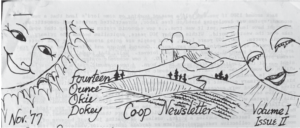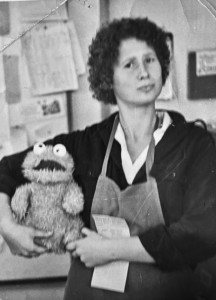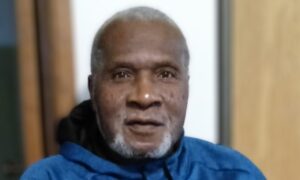A formative period for the Olympia Food Coop — and those who helped to organize it
In 1977, the brand-new storefront Co-op downtown on Columbia Street was slowly coming together, the result of volunteers building shelves, laying flooring, and setting out food.
I had moved out West to find my people—the hippies. The best place to look was near co-ops and collective restaurants that sprouted up wherever hippies had settled. Before leaving Madison in 1976, I found a list of all the co-ops on the West Coast. The only listings for Olympia were a couple of “food conspiracies,” which I later learned were food-buying clubs.
The year I arrived, these food buying clubs were shifting to become a storefront, which for some people signaled a loss of direct democracy over their food. After a year of controversy, the storefront opened with new members. Charlie Lutz, one of the organizers, served as the first staff person.

Since this was the first year of operation, there wasn’t much history to go on. Process was something we made up as we went. No bosses and lots of opinions. As part of our emergent way of doing business, early hiring decisions were made by vote. Anyone interested in Co-op business could just show up at a meeting to participate.
The early days were light on amenities like chairs or board rooms, so our meetings were held in the center of the new store with everyone seated on five-gallon tubs or grain sacks. Flour dust wafted through the air, along with the scent of produce edging past its prime. The buzz of the aging coolers provided a soundtrack. Notes were taken on the back of old fliers and food orders. Overall, we operated with an underlying belief that none of the earth’s resources should be wasted. Beyond the environmental concerns, it would add to the cost of food, an essential commodity for all people regardless of means.
Soon it was time to hire (elect) a second staffer. That sounded like the job for me. I had already worked on a few elections, notably the 1973 election of Paul Soglin, the so-called “hippie mayor” of Madison, Wisconsin. But I had never been up for election in my own right.
I remembered everything I learned from my grandfather who was a Milwaukee ward boss from the 1930s on. He ran many campaigns and knew where to find the voters. Being the beer capital of the nation, all politics happened in taverns. If the crowd already supported the candidate, he passed out matchbooks. If they were a hard sell, he bought a round of drinks for the house.
With those stories in mind, I figured I should head to Olympia’s most popular hippie bar, the Rainbow Restaurant. After a couple beers with friends, I went down the block to the Co-op hiring meeting. That night, there were only two of us who wanted to become the second staffer. As candidates, we each made our pitch for the job, sharing our experiences as a way to underscore our belief in food co-ops.
Being only 19, my stories were few. I talked about the horror of touring the Oscar Mayer plant back home in Madison, something that grade schools did every year to teach and celebrate our food factory history. On every trip, at least a couple kids hollered out, “Hi Dad!” Oscar Mayer was a showcase of barbarism toward animals and immensely wasteful. By high school, when the book Diet for a Small Planet came out (Frances Moore Lappe, 1971), I learned the political impacts of eating so high on the food chain.
Sometime later, I wrote a cover story for the Cooper Point Journal titled, “Agribusiness: A View from the Dumpster,” which examined the politics of food. At that point, I wanted to dedicate my life to the Olympia Food Co-op as a means to gather healthy food from ethical and sustainable producers and make it affordable to low-income people in a way that upheld workers rights. All that and I needed a job.
We cycled between campaign pitches and votes, deadlocked each time. After the fourth round, my gaggle of bar friends finally stumbled in through the front door and boisterously sat down. Once the final vote was taken, I got voted in as the second staffer. My opponent was pissed off.
“You didn’t win. You rigged the vote with all your drunk friends!”
She was right—that was not the way to run a co-op. This was the first of my Olympia Food Co-op dramas, born of sincere young people trying to figure out the best way forward. In the years that followed, trial and error made for better decision making. Our learning was also enhanced by a nationwide conversation held by cooperators via letters, publications, and conferences. But at the time of the vote, our concept of how people should work together for the common good was a rough work in progress.
Shortly after I started, Beth Hartmann was hired as the third staffer, and for a short time Beth and I were the dynamic duo. Then Charlie Lutz left and Jim Cunningham was hired. Beth, Jim, and I became a troika.
Largely because of Jim’s talents and experiences, he gravitated toward being the brains on the staff. His cerebral palsy limited his ability to hoist fifty-pound sacks and tubs, which left Beth and me to serve as the brawn. The delivery days were an intense workout, only slightly improved once we got a hand truck. We’d line up a bucket brigade of people to haul in all the grains, liquids, and boxed goods to their respective nooks for storage.
Not having a walk-in cooler meant that all perishables went directly into our second-hand display coolers, often packed beyond capacity on delivery days. Eventually, we made an arrangement with Laura May from the Rainbow Restaurant to rent some cooler shelf space, but still our produce suffered. Our motto of “Waste not, want not” prevailed, and we managed to persuade, perhaps guilt trip, some of the members to buy the overripe food to avoid wasting any of it.
The sacks of grains had to be hauled up a ladder to a mezzanine storage loft, an odd space that only had four and a half foot clearance. Getting them up there was a schlep, but moving them into their individual piles was dangerous heavy-lifting in a crouch. Totally insane. All kinds of OSHA violations. Sometimes we’d throw twenty-five-pound sacks down on the main floor, other times Beth and I would play catch with the bags of legumes.
I stayed with the Co-op for about a year, on par with my attention span as an almost 20-something. Since we barely made minimum wage, I often ended the month owing more on my food tab than I earned. But I did earn a wealth of knowledge about community building and how to come together around a basic survival need—food.
It meant a lot to me to work outside the corporate agribusiness model and to help raise consciousness about where food came from. Local control over the supply of healthy food was a cornerstone of the community we created together in Olywa during that generation. And learning together how to run a cooperative food business for people, not for profit, was a powerful experience. All of that was amazing during our first year, but we quickly outgrew the cramped little store.
I left the Co-op to attend Evergreen, solely to mobilize a team to relocate our store to the Westside. After that school year, I returned for a second stint at the Co-op. This time we had a real walk-in cooler, aisles lined by well-designed shelves and new refrigerated cases to display the perishable food. We finally developed a children’s play area, which proved to be the most effective way to stop kids from diving into flour bins. Our membership had grown exponentially, our staff had expanded and our board had matured as had our decision-making process. We had become a real food store run on cooperative principles.
After another year, I left once again, this time for good. I remained a loyal Co-op member, but I had lost my tolerance for long meetings and was never again deeply involved. My years at the Co-op taught me that communities work best when they have control over how they meet their essential needs. Those core beliefs have stayed with me all my life.
Olywa Days of Change is gathering memories from the 1960s to the 1980s for a book project.For three decades, Olympia, Washington was a crucible for cultural revolution. We are collecting memories of those turbulent and creative years not only as a community history but also to see what peoples’ experiences can teach us about many of the same issues today.” —Don Martin To participate and for more information: |

Be First to Comment